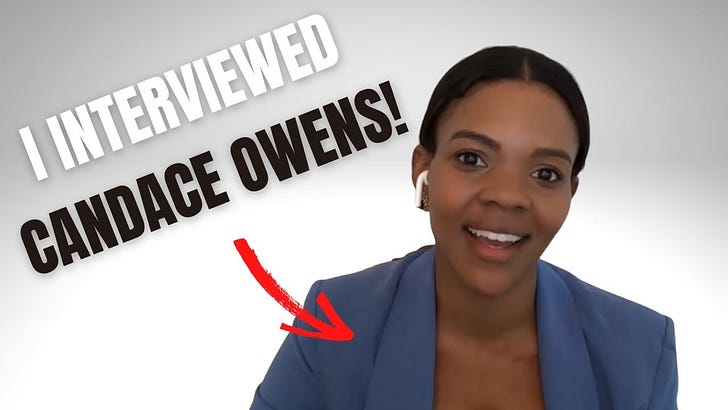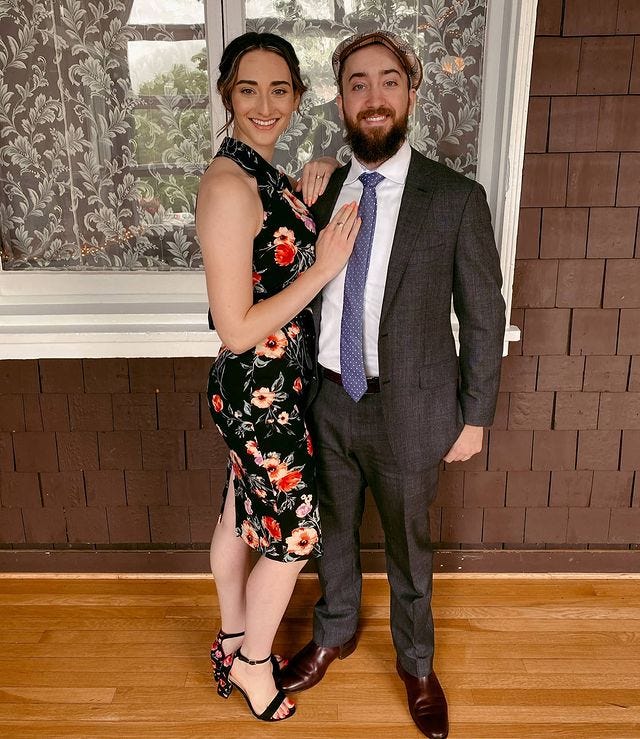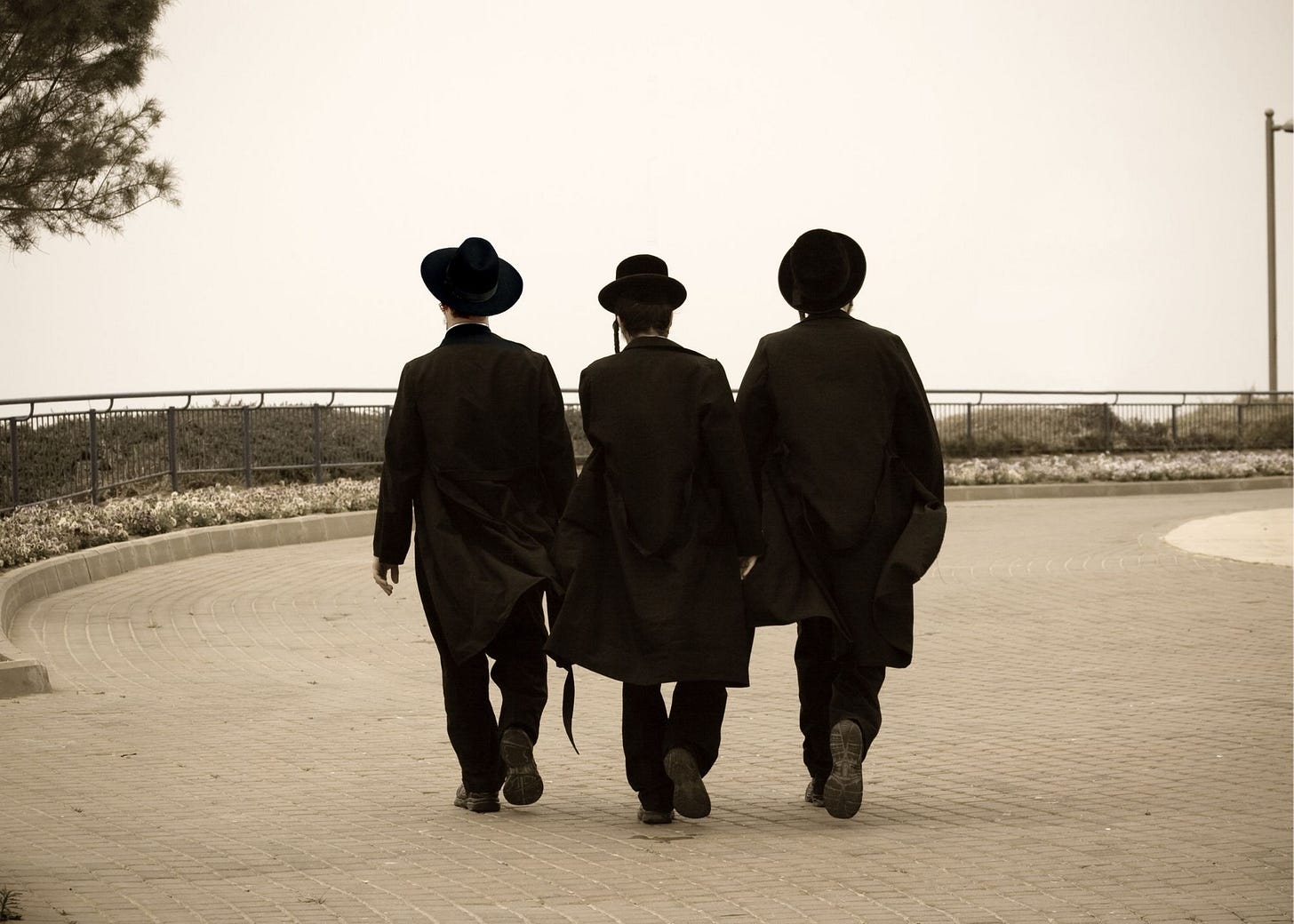Get To Know CANDACE OWENS - WOMAN, Mother, And Fierce Conservative!
Quote of the Week:
"Never let the fear of striking out keep you from playing the game." - Babe Ruth
What You Might Have Missed At Classically Abby…
Classic Style Inspo
It’s officially wedding season! Jacob and I just attended our friend’s wedding and got all dressed up. The invitation said “semi-formal” so, of course, I immediately went online to search what that meant. Semi-formal generally means shorter cocktail dresses for women and suits for men. I found this dress at, you guessed it, T.J. Maxx and fell in love. It’s so flattering and easy to wear, and it’s modest to boot!
Things I’ve Been Loving: Foundation Brush
I recently purchased this makeup brush and I can’t believe how much I love it! Ever since I got it, I have not used anything else. It looks a bit different than other brushes I’ve used in the past, but it applies my makeup so quickly and I don’t have to worry about it growing bacteria (which is a concern with makeup sponges). If you’re looking for a new foundation brush, I highly recommend this one!
GUEST POST: Jews Are Being Attacked In The Streets. Here’s How You Can Actually Help.
By Jacob Roth
Jews have been under attack the last several weeks. Mobs of “pro-Palestinian” activists swarmed Jews eating outside at a restaurant in LA to ask, “Are you Jewish?” before beating them on the sidewalk. In Manhattan, two Jews were ambushed by a crowd outside of a bagel store. Elsewhere in New York City, a Palestinian activist jumped out from a convoy of trucks and cars that waved the Palestinian flag to throw an explosive at a crowd of Jews on the sidewalk. In London, an older Jewish man was beaten by a mob before they sexually assaulted his daughter. Fittingly, a caravan of Palestinians drove down the streets of London days later shouting through a bullhorn, “F*** the Jews, rape their daughters.”
All good-hearted people hear of these atrocities and want to do something about it. But the default activism of so many people -- whether everyday people, politicians, celebrities, or media figures -- doesn’t work. It doesn't work because it can’t work. The activism of raising public awareness about Jews being beaten in the streets through tweets or posts that state “anti-semitism is bad” and “violence against anyone based on their religion is unacceptable” can't work.
So many of us jump to this approach because it is the activism we’re used to seeing. The rise in “anti-racist” activism and the Woke crusade against the racism, sexism, homophobia, and other bigotries that the Woke accuse so many institutions of perpretrating has made us all familiar with something I have called the “name and shame game.” We’re used to seeing activists take to social media or the digital public square to announce how “X practice or belief is, in fact, racist, sexist, or otherwise bigoted,” and how “that kind of hate is abhorrent and not tolerated.” And we’re used to seeing that kind of activism get results: from companies changing what products they offer, to the cancellation of shows, books, or speeches, to educational institutions changing their courses and hiring practices, and beyond. After seeing that activism work for several years, we naturally jump to doing something similar when there’s blatant, violent Jew hatred in the streets of American cities. But the "name and shame game" doesn’t work for this Jew hatred. Why? Because there’s a crucial difference between the Jew-haters and the usual targets of "name and shame game" activism we’re used to seeing: the Jew-haters know that what they’re doing is Jew hatred and that it hurts Jews, and they don’t care.
All the institutions and individuals we’ve seen leap to change their ways in response to the "name and shame game" have done so because they believe that racism, sexism, and the other bigotries are bad. That’s why that approach works. That’s the only way that approach works. The "name and shame game" puts the ball in the target’s court and gives the target all the agency to change. It relies on the target wanting to change, wanting to flee any chance of association with bigotry. You can see that demonstrated in how little follow-through is needed to get corporations, schools, or media to change their ways after they’re targeted with the “name and shame game.” How many boycotts are done? How much further arm-twisting is needed as follow up to get the kind of changes we’ve seen big institutions make? None at all. It’s because the activists and their targets share the same standard: “bigotry” is wrong and must be avoided. The "name and shame game" is really about fixing the “ignorance” of the target about the allegedly bigoted nature of its own practices. It’s along the lines of the activists giving their targets a heads-up that they should be acting differently: “FYI, this practice of yours violates your own values. You should be aware.” When the target is desperate not to be bigoted, to appear bigoted, or to be at any risk of association with bigotry, that FYI is enough. It’s a tactic that works so well because the big institutions of American life abhor being accused of bigotry so much that they surrender to Woke allegations of bigotry immediately no matter how far-fetched.
The Jew-haters beating Jews in the streets are completely different. The "name and shame game" doesn’t work on them. How could it? People who kick, punch, and beat Jews in the streets of Los Angeles and New York are well aware that what they’re doing targets Jews just for being Jews. That’s the point. They are not ignorant of the fact that what they are doing is anti-semitism. They know what they’re doing and want to be doing it. There’s no gap between their values and their actions for you to point out for them. The "name and shame game" does not work and cannot work with these people, no matter how much we’re used to seeing it work for all these other causes.
So, what does work? When dealing with people like Jew-haters, who hurt people knowingly and intentionally, activism works if it achieves one of two goals: 1) reduce the targets’ ability to cause harm or 2) reduce the targets’ motivation to harm. These goals can be referred to as “defanging” and “demoralizing” respectively. Anything you do that moves towards either defanging or demoralizing Jew-haters is something that adds to the solution. Anything you do that furthers either of those goals, no matter how small, is on target.
We’re all more powerful than we think and we all can add to activism in ways we overlook. The biggest power we have is also the simplest: confidence in our convictions in public. In our own lives, countless of our opinions, our tastes, and our decisions are given a nudge by the people around us who have confidence and conviction in their own choices. Even for big things, like how we think about marriage, where we want to live, what career we will choose, the smallest of suggestions we see or hear from other people pushes us in a direction we otherwise wouldn’t have considered. Don’t underestimate the small decisions, the small stands, or the small actions you can inspire others with. Everything you do contributes to making things more or less possible for yourself and other people to imagine, find practical, and find appealing.
While the “name and shame game” won’t help in defanging or demoralizing Jew-hate, you do have clear, simple things you can do socially, economically, and physically.
Socially, we are all inspired and influenced by the people we know and like. This goes both ways. Jew-hate is made worse and more widespread when politicians, celebrities, and the media loudly and proudly slander Israel as guilty of enormous evil like apartheid and genocide. When public figures use their prestige, reach, and clout to give credibility to ridiculous, bloody lies, their audiences around the world who trust them will hate Israel as an evil nation, hate Israelis as murderers, and hate Jews around the world for their connection to Israel and their assumed support of Israel’s “crimes.” Ironically, this works similarly to when the media slander a group of people as Nazis or alt-right: some people in the audience who believe those accusations are whipped up in anger to attack the accused “Nazis” socially or physically, while many others refuse to intervene or condemn the attacks because they have no empathy for “Nazis” or “alt-righters” who are “getting what they deserve.” The Covington Catholic case is a good example of this kind of slander in action.
The boy at the center of that case, Nicholas Sandmann, was approached by a Native American man with a long record of criminality, who beat a drum in Sandmann’s face without explanation while staring him down. Leading up to this, a group of Black Hebrew Israelites, all adult men, were shouting at Sandmann and his fellow high school students, yelling racial slurs at them about how whites are evil. Unsure of the situation, Sandmann tried to be affable and friendly and smiled at Phillips. That smile was caught at an angle and moment that made it look like a smirk. Something as simple as a smile caught at the wrong moment was enough to get Sandmann labeled a racist, a bigot, and a vile avatar of white supremacy and entitlement in the minds of many in the media. Based on this reporting, Sandmann received death threats and threats of violence, including from celebrities and journalists. There was limited public outcry about his treatment until the story was debunked -- because people believed that Sandmann had been so terrible, they had no empathy for what people were doing to him. CNN, MSNBC, The New York Times, The Washington Post, and others pushed the lie that Sandmann was worth hating. Because so many people think those sources are credible and prestigious, the lies about Sandmann went viral -- and people took them seriously.
There’s a similar dynamic with the lies that motivate Jew-hate. People with large platforms, prestige, and credibility play a big role in convincing people that Israel is guilty of vile, ridiculous crimes that deserve hate and that the Jews who support Israel (or who are assumed to support Israel) are proudly complicit in those alleged crimes. Of course, these lies lead to Jew-hate that motivates beating random Jews in the streets. And of course, those lies lead normal people to dismiss violence against Jews in America and across the West as just an “ethnic conflict” or a scenario that has “two sides.”.
What you can do about this from a social perspective is to play a role in taking away the credibility, the prestige, and the platform of the people who push the lies. When someone brings up Ilhan Omar, Rashida Tlaib, AOC, the Associated Press, or the New York Times, you can calmly, simply state that you have a low opinion of them because of what they’ve done to slur Jews and encourage attacks on them. Simple, firm statements from normal, reasonable people do more to make a position appealing to other people than rants from a hyper-motivated activist. Do the same on social media: make simple, firm statements identifying who has disappointed you and how. Describe how you no longer think of these people or institutions as credible or prestigious, but as tainted and disreputable. You do more to change the social landscape by these small statements than by any number of generalized condemnations of anti-Semitism.
Economically, take the step to go elsewhere for information, punditry, and entertainment. There’s more content out there than any of us can watch in our free time. For every show, news source, or pundit, there’s a competitor working in the same space. You don’t have to resign yourself to supporting the people who cheerlead and cover for violent attacks against Jews with your viewership. Vote with your time and attention, support what you can stomach and let the people who don’t deserve your time and attention wither without it. If a political show uncritically hosts the Squad or someone who propagandizes for Hamas and perpetuates one-sided lies about Israel -- vote with your eyes. Do the same wherever you can, as you can. We live in a market. Each decision we make has the power to create or destroy what’s on offer and what can be sustained. And when you do it, let others know by simple, firm statements about your standards. We never know who we will inspire and what we make more possible by soft-spoken, confident witness.
The physical approach is different from the other two. The goal of the social and economic approaches is to defang the people who whip up and cover for Jew-hate by taking away their prestige, credibility, and platform. The physical approach is about giving Jews who would be attacked the ability to defend themselves, while giving the mobs and thugs attacking them a strong reason not to. Just as black Americans in the Jim Crow South had only themselves and their right to a firearm to rely upon when mobs attacked them and the police would not help, could not help, or were even directly cooperating with the mobs and Klan, so too do Jews fundamentally have only themselves and the right to a firearm to rely upon. Just as how gun control policies deprived black Americans of the ability to protect themselves when they were outnumbered, isolated, and under threat from violent racists, so too do gun control laws deprive Jews of the same ability when mobs swarm them in the streets.
In New York City and Los Angeles, where Jews are hit with explosives or ambushed on the sidewalk, concealed carry permits are only granted if you can show “good cause” or “proper cause” that they are necessary. Practically, the only way to show “good cause” is by proof that you have personally been threatened or if you have already been attacked and survived. A Jew who knows she has a target on her back must wait to be attacked and survive before can attempt to get a permit to own a weapon to defend herself. Unlike states like Virginia where the law requires that the government find a reason to deny your permit or else grant it to you within 45 days, the process in NYC and LA can take 6 months or more -- all for the state to deny your application in the end because you have demonstrated insufficient need in the personal opinion of the judge or sheriff reviewing your application.
Knowing the stories of the attacks and seeing the videos, take a moment to consider what on Earth could be done to avoid the maiming or death of Jews beyond just relying on the luck of having enough police nearby. Think about the Jews who cannot run away and ask, honestly, what could they hope to do against a crowd?
If you oppose concealed carry, a small step is letting yourself re-evaluate how opposed you should be. If you believe regulations for concealed carry should be strict, a small step is reconsidering whether the “good cause” requirement is so necessary when it forces Jews who know they’re being hunted in the streets to first wait to survive an attack and then wait for half-a-year further before they might have a chance to defend themselves. If you support concealed carry, a small step is helping other people connect the dots that concealed carry is important for protecting vulnerable people from the worst among us. Explain in the public square how Jews who want to defend themselves are left defenseless by seemingly “common sense” gun restrictions. Explain that the laws should change and that Jews, and all other vulnerable people, should learn to arm themselves. If you are Jewish and concealed carry, let the world know. Let your community know. By your simple act of witness, you help other people see concealed carry for Jews as something normal and common sense. When people see a normal person concealed carrying for common sense reasons, they see how it’s not a big deal and it’s something they can support.
All of these options, socially, economically, and physically, are ways that you can defang or demoralize Jew-haters and protect Jews from violence in the streets. All of these options are more fit to purpose than relying on the “name and shame game” to get a violent Jew-hater to “realize” that beating a Jew on the sidewalk for wearing a kippah is anti-Semitic and therefore wrong. And, importantly, all of these options are small, simple actions that anyone can take at low cost and easily sustain while making a powerful difference.
Welcome to Classically Abby!
I'm your resident #ConservativeInfluencer, opera singer, fashionista, makeup artist, and wife with a classic take on the modern world. Follow me on YouTube, Instagram, and Twitter to see how! And together, let's be classic.







I ordered the makeup brush!
I don't get hate in the sense that you and Candace get it, but what helped me to deal with people making nasty comments on the internet and in person was finding something I care about more, for me it's God and my horse, I know that it doesn't matter what people think of me because God and my horse, Jesse, will always love me. I'll have them no matter what, and what they think about me is ultimately more important than what the world thinks of me.